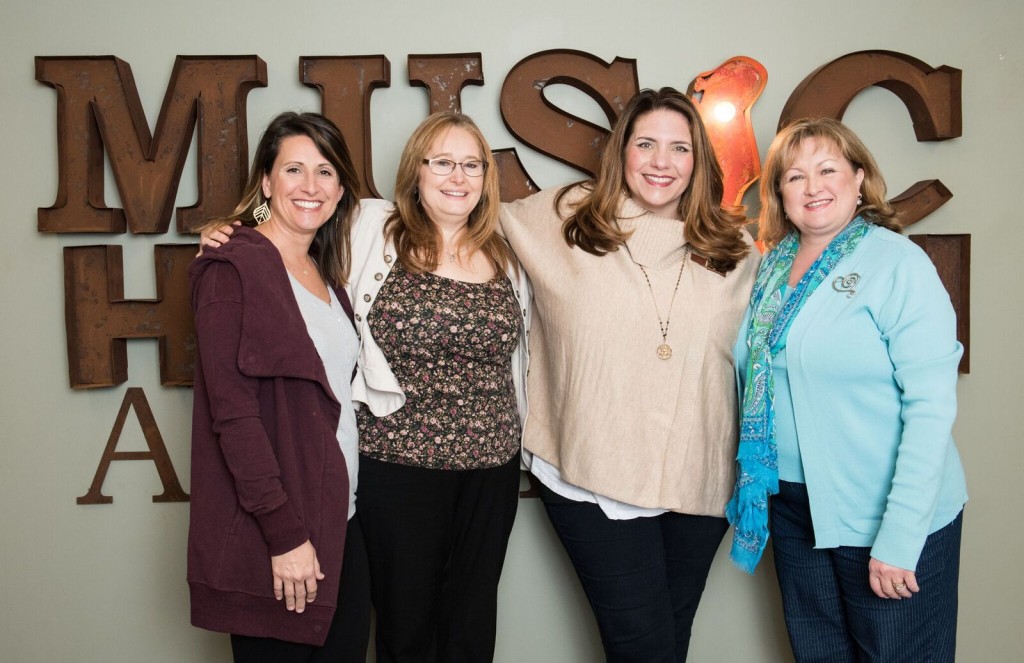

Pictured (L-R): Kimberly Dunn, Colleen Hoagland, Tatum Allsep, Shelia Shipley Biddy. Photo: Ashley Hylbert
For more of MusicRow‘s feature on Music Health Alliance, pick up the 2016 MusicRow Awards print issue, available now.
As a child growing up in Mississippi, Tatum Allsep assumed she would follow her family into a health care career. Her mother was a nurse, while her brother and grandfather were both surgeons.
Allsep moved to Nashville in 1993 to attend Vanderbilt University and pursue medicine, before the Nashville music industry came calling by way of an internship at MCA Nashville. She worked at MCA for the better part of a decade, and there met two women who became her biggest allies, Shelia Shipley Biddy and Kimberly Dunn.
Today, as founder and executive director for nonprofit Music Health Alliance (MHA), Allsep aims to be a healthcare resource for music industry members. Biddy serves as Music Health Alliance’s director of operations and certified senior advisor, while Dunn is director of advocacy and insurance.
The MHA reports that 76 percent of music professionals have no access to group health insurance, as they are self-employed or part of a small business. For many, a major unexpected health crisis can mean financial disaster. The majority of Music Health Alliance’s clients—79 percent—reside in the Middle Tennessee area, though many come from other music pockets across the nation, including California, New York, Texas, Florida and Georgia.
The stories of music industry members aided by Music Health Alliance–representing 4,000 music industry members and $10.8 million in healthcare cost reductions as of 2015—are numerous.
MusicRow spoke with Allsep and Biddy about the impact Music Health Alliance has had on Nashville’s music industry.
MR: Tatum, what made you passionate about the issue of health care in the music industry?
Allsep: I was pregnant with twins, went into preterm labor and was in the hospital for six weeks before they were born. They were in the hospital for nine weeks. I had health insurance and maternity rider at the time, and I left the hospital with a half-million dollar bill. That started my quest to learn more. I learned very quickly that this was not just my plight. There are so many people in our industry with the same story.
Last year, the second annual MHA fundraiser The First and The Worst, held at City Winery, raised $230,000 and featured Garth Brooks, Bobby Braddock, Lee Brice, and Jessi Alexander. How did the idea come about?
Biddy: I love doing events, so putting my arms around that event was something I loved and keeping people on task, that was like running Decca Records. I was talking with Katie Gillon who told me about the idea from [songwriter] Sandy Knox, and I saw a vision for it. It had been presented to others but they said, “Nobody wants to hear one more bad song.” But the event isn’t about the bad songs that we’ve all got boxes of. It’s about the creative process, going back and looking at something they wrote when they were younger…and then at those masterpieces are that will live forever. That worked for me.
Allsep: It sold out so fast. We didn’t even save a table for staff. It was a great night and it raised $230,000, which is more than half our annual budget, in one night. That’s huge for a new nonprofit. First and Worst is our cornerstone annual event. Our first event raised $30,000. We are starting to plan for next year.
Obviously, the Affordable Care Act has gotten much attention from the press in the past few years, both positive and negative. From your perspective, how has it affected music industry members in need of healthcare?
Allsep: It has made affordable what was once not affordable. There is a big misnomer in our industry that fame equals fortune. That’s just not always true. If your income falls below 400 percent of the federal poverty level, there are usually cost-sharing reductions and subsidies. That hadn’t existed before. That is an incredible opportunity, especially if you’ve got children, because most people fall into this category.
It used to be if you had a policy, it was only good in the state of Tennessee. That sucked if you were recording an album in California or Colorado or another state. If you have a diagnosis of a life-threatening illness, and you don’t have health insurance, there is a special enrollment period that can be created for you. Many people don’t know that.
What do you most want the music industry to know about Music Health Alliance?
Biddy: In our industry, whether you are an executive or a superstar, there is sensitivity about not wanting people to know that you are hurting. Here, it’s a safe place. We all talk the same language. I’ve been on the bus in the middle of the night in different cities. That makes it easier because they can let their guard down.
Allsep: From birth to end of life, if you have a health care need of any kind, whether you are at the top of the totem pole or at the bottom, we don’t care. We are here to help. We are here to protect, with finding health insurance or ways to pay for your healthcare. We direct with confidential guidance. We will listen and help you navigate. And we connect—with financial resources, housing resources, whatever it is to help you gain access to health care and help you live well.
For more information, visit musichealthalliance.com.

Category: Featured
About the Author
Jessica Nicholson serves as the Managing Editor for MusicRow magazine. Her previous music journalism experience includes work with Country Weekly magazine and Contemporary Christian Music (CCM) magazine. She holds a BBA degree in Music Business and Marketing from Belmont University. She welcomes your feedback at jnicholson@musicrow.com.View Author Profile


